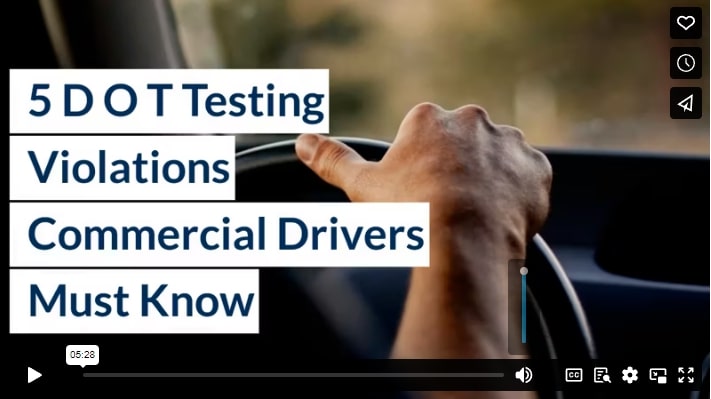5 DOT Testing Violations Commercial Drivers Must Know
If you are a professional driver, your employer and the Department of Transportation (DOT) have various regulations you must follow to keep your commercial driver’s license in good standing and operate a commercial vehicle safely. One policy they take seriously is their requirements for drug and alcohol screening. Here is some critical information about the testing scenarios you will encounter, what they consider violations, and how they are handled.
DOT Required Testing Situations
The DOT requires testing in six scenarios for drivers. You should be familiar with them. But, you only need to be concerned with pre-employment and randomized testing if you do not use substances.
- Pre-Employment: Unless your employer has a DOT specimen collector certificate, you must provide a urine specimen for pre-employment checks at a DOT testing center. You won’t need alcohol screening here unless your employer incorporates this as part of their checklist for all their drivers.
- Reasonable Suspicion: The DOT requires education on the signs and symptoms of substance use in the workplace. If another employee or supervisor reasonably suspects you are under the influence at work, you may have to submit to testing. Your employer can assess your condition based on your appearance, speech or other behaviors, and body odor.
- Post-Accident: When you have an accident that results in a citation for injury, disabling a vehicle, or results in a fatality, you will be required to submit to DOT breath alcohol testing within eight hours and a urine specimen for drug testing within 32 hours.
- Randomized: The DOT requires employers to conduct and provide records for a certain number of randomized tests in a certain period. You can be randomly selected for a drug test even when off-duty at home. However, alcohol testing will only occur immediately before, after, or during a shift.
- Return-To-Duty: If you have violated testing regulations or protocols and your employer has had to temporarily remove you from your safety-sensitive duties, you will be required to pass a return-to-duty substance test upon completion of a substance abuse program.
- Follow-Up: Besides the return-to-duty testing, the substance abuse professional (SAP) will prescribe follow-up testing for up to five years after completing the substance abuse program.
DOT Drug Screening
Your employer may have particular testing policies with different specimen collection techniques, but your DOT drug screening will always be via urinalysis. They will check for marijuana or THC, cocaine, amphetamines, opiates, and phencyclidine or PCP. When submitting for a test, ensure you have a full bladder by drinking plenty of fluids. If you are worried about a shy bladder, a small amount of caffeine one to two hours prior can help get things going. Knowing what the DOT considers violations before submitting for testing is crucial, so you can avoid penalties and maintain your CDL in good standing. Here are the main five violations:
Substance Use on Duty
Under no circumstances are you allowed to use illicit drugs, including marijuana, or alcohol while operating a commercial vehicle. You may not report for work with banned substances in your system or within four hours of consuming alcohol. In addition to the main five drug classes you cannot use, taking any medication prescribed by your doctor with instructions not to operate can cause a violation. Be sure to read all medication warnings carefully.
Positive Test
A positive alcohol test is .04 or greater blood alcohol concentration. There are differing cut-off guidelines for the different substances in your urine test. The lab will screen for the five drug classes. If positive, the lab’s Medical Review Officer (MRO) will speak to you to see if any prescription medications or circumstances could justify the positive result. If not, the MRO will report the result to the national Clearinghouse and then follow the positive test protocol, including being removed from driving duties and enrolling in a substance abuse program.
Refusal to Submit for Testing
If your employer notifies you that you must submit to alcohol or drug testing and you refuse or fail to do so, they will have to treat it like you had a positive result. If your employer randomly selects you for a test, you must report for testing immediately or it’s considered a refusal. If you have a shy bladder and cannot produce urine within three hours, a physician must evaluate your situation and declare the medical condition; otherwise, it will be considered a refusal.
Violating Testing Procedure
Failing to provide the requested sample, tampering with it, or interfering with the testing process in any way can result in suspension or revocation of your CDL.
Falsifying Test Results
If you attempt to falsify your test results or try to cheat on the test, therefore violating testing procedures, you can face disciplinary action.
In addition to these five scenarios, you cannot use a commercial motor vehicle to transport undeclared drugs or alcohol. If you commit a violation, you face immediate removal from driving and other safety-sensitive duties, suspension or losing your CDL, paying fines, and going to prison. The offense may affect your ability to reapply for your CDL in the future. Your employer may have an additional zero-tolerance policy for drugs or alcohol, resulting in immediate termination. Even if you maintain your job, going through a violation and the return-to-duty procedures can increase stress and financial strain on you and your loved ones from prolonged unemployment. Many companies will not consider applicants with substance histories, so it’s always better to be extra cautious.
Infographic
Truck drivers must follow DOT rules, including urine tests for substances, to maintain a commercial driver’s license. Violations, such as on-duty substance use or tampering with tests, lead to penalties. Offenses can cause job loss, financial strain, and impact future job prospects due to strict employer policies regarding substance-related issues.

Video


